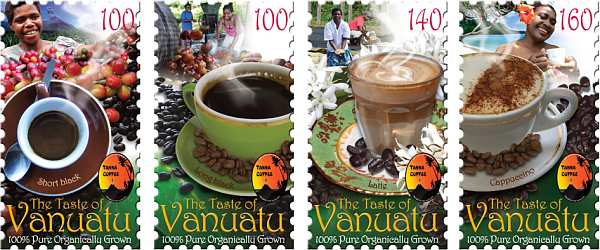Tanna Coffee
-
Denominations :100 vatu x 2 stamps; 140 vatu and 160 vatu
-
Designer :Denise Durkin, Wellington, New Zealand
-
Paper :104 gsm Tullis Russell gummed stamp paper
-
Perforation Gauge :13.3 x 2
-
Period of Sale :23 March 2011 for a period of 2 years
-
Printer :Southern Colour Print, Dunedin, New Zealand
-
Process :Offset lithography
-
Stamp Size :25.00mm x 45.7mm, 4 vertical stamps
Description
 The Tanna Coffee Development Company was established in Tanna in 1982, to assist Vanuatu soon after its independence.. This operation lasted until the mid 1990’s, when severe climatic conditions and leaf rust disease caused its demise. The company was sold to private investors, who introduced stronger varieties. Utilising the plentiful rainfall and rich volcanic soils, the purest hybrid Arabica Coffee (semi-Dwarf Catimor varieties) were planted out under the Smallholder Programme. These resulted in encouraging production levels, with this year’s production anticipated to be over 50 tonnes.
The Tanna Coffee Development Company was established in Tanna in 1982, to assist Vanuatu soon after its independence.. This operation lasted until the mid 1990’s, when severe climatic conditions and leaf rust disease caused its demise. The company was sold to private investors, who introduced stronger varieties. Utilising the plentiful rainfall and rich volcanic soils, the purest hybrid Arabica Coffee (semi-Dwarf Catimor varieties) were planted out under the Smallholder Programme. These resulted in encouraging production levels, with this year’s production anticipated to be over 50 tonnes.
Tanna Coffee’s objective is to provide the coffee consumer a unique and natural quality product, and ensure that the local smallholder farmers receive the maximum benefit for their efforts, while growing their product in a truly sustainable manner. The process begins withTanna Coffee date stamp the hand picked cherries being processed at 35 pulperies on Tanna. The cherries are pulped, naturally fermented, washed, screened and sun-dried prior to transportation to the Dry Processing Factory. Here the dry skins are removed, 'green beans' graded according to size and then bagged ready for shipping to Port Vila. The coffee beans are then carefully roasted as part of the 25 steps in the process from the 'plantation to the cup'. Modern international standard packaging completes the process. Currently, all coffee is sold in roasted and packaged form through Tanna Coffee’s facility in Port Vila with 70% being distributed locally and the balance being exported overseas. The Roasting Factory has now been developed to cater for tourist visits.
Production from the 550 farmers has increased and has allowed them the opportunity to increase their earning capacity and provide market access. Approximately 500,000 trees have been planted on Tanna alone and 100,000 planted on other adjoining islands with plans for more. The aim of creating a viable and sustainable industry capable of satisfying international demands will continue, while maintaining the unique quality that the 100% organically grown Tanna coffee possesses.


